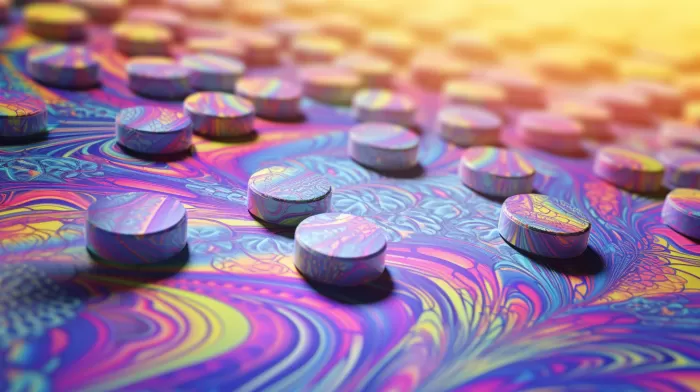LSD, often associated with psychedelic rock concerts from the 1960s, may hold the key to helping alcoholics overcome their addiction. This powerful hallucinogenic drug has the potential to revolutionize the way we treat alcoholism, according to researchers in Norway. They believe the key to success lies in understanding how LSD interacts with the neurotransmitter serotonin, which plays a role in regulating mood, appetite, and sleep.
Unpacking the Studies
Researchers at the Norwegian University of Science and Technology (NTNU) took a deep dive into experiments from 40 years ago that examined using LSD to treat alcoholism. They found that a single dose of LSD allowed many people to quit drinking and remain sober for an extended period.
Their research involved analyzing six different studies from the late 1960s, which looked at the effects of LSD on a total of 536 individuals. By combining the data from these studies, the Norwegian researchers concluded that the experiments demonstrated a 60 percent success rate at helping people quit alcohol for at least six months, after just one dose of LSD.
The Science Behind LSD’s Effects
The exact reason why LSD works this way remains a mystery, but the researchers do know that it is not toxic or addictive. Furthermore, they understand that LSD has a significant impact on the imagination, perception, and memory. The drug interacts with serotonin receptors in the brain, stimulating the formation of new connections and patterns. LSD appears to open an individual to an awareness of new perspectives and opportunities for action.
It’s quite rare for psychiatric drugs to have a lasting effect for several months after just one dose. With a better understanding of alcoholism as a chronic, relapsing disorder requiring ongoing treatment, the next step should involve providing periodic LSD doses combined with modern evidence-based treatment programs.
A Possible Solution for Alcoholism
Alcoholism affects millions of people worldwide and is a significant cause of preventable death and disease. Despite the availability of various treatments, relapse rates for alcohol addiction are high. The introduction of LSD, as a non-toxic and non-addictive treatment method, could dramatically change the treatment options for this challenging condition.
While the positive effects of LSD in treating alcoholism appear undeniable, taking the drug can be associated with negative side effects. Some people experience a “bad trip” with symptoms such as anxiety, agitation, and paranoia. However, these adverse effects may be minimized if the treatment is administered in a controlled and properly monitored setting.
Taking LSD Treatment Forward
The Norwegian researchers’ conclusion that further research is needed to understand LSD’s potential as an alcoholism treatment is an essential first step towards helping more people overcome their addiction. As the experiments they analyzed were conducted more than 40 years ago, it is necessary to replicate the studies with modern research techniques to validate the findings properly.
Furthermore, researchers must explore other aspects, such as determining the ideal dosage of LSD, evaluating how often the treatment should be given, and whether it would work best in combination with other therapies. Additionally, they need to investigate any possible long-term side effects of using LSD to treat alcoholism.
A Brighter Future for Alcoholism Treatment
LSD has the potential to offer a breakthrough in alcohol addiction treatment. While much is still unknown about the drug’s mechanism of action, initial research findings indicate that it may be beneficial for a sizeable portion of the alcoholic population.
By incorporating data from decades-old studies and pushing forward with contemporary research, scientists have an opportunity to unlock the full potential of LSD’s therapeutic power. Further investigation of its effectiveness, coupled with modern treatments, could create a brighter future for millions who are struggling with alcoholism today.
In conclusion, the re-examination of the use of LSD as a treatment option for alcoholism demonstrates the importance of delving into the past, reassessing the evidence, and combining old knowledge with new discoveries. Doing so may lead to transformative breakthroughs that can improve the lives of countless individuals suffering from addiction and other challenging conditions.



